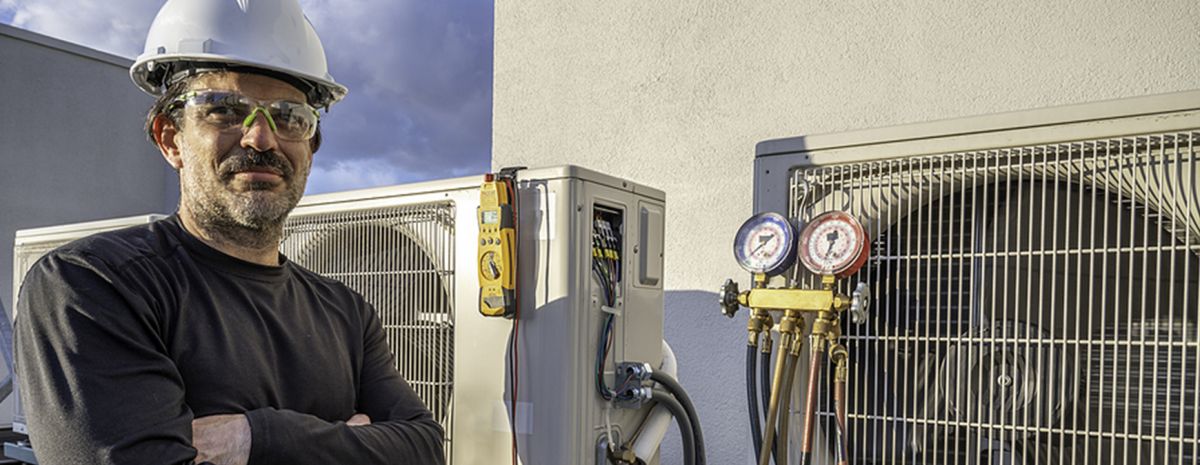TWS is a Great Training Option for Everyone
Learn more about how we can prepare you to advance your career.
HVAC stands for Heating, Ventilation, and Air Conditioning, but often you’ll see an R attached to the end of this acronym as well, and that R stands for Refrigeration.
So what are the differences between an HVAC and Refrigeration career in Jacksonville, Houston, or Tulsa?
The Bureau of Labor Statistics puts them together into one job description: Heating, Air Conditioning, and Refrigeration Mechanics and Installers in the Occupational Outlook Handbook.
Refrigeration technicians are often considered one type of HVAC worker.
Have You Considered a Career in the Skilled Trades?
Fill out the form to recieve a no obligation info packet.
What are the differences in job requirements?
Both HVAC and refrigeration careers are focused on heat transfer.
However, refrigeration mechanics may be more specialized to work specifically on refrigeration units, while HVAC techs may work on multiple elements within the field, including refrigeration, heating, and air conditioning.
While HVAC is the name for the field which includes refrigeration, there might be some differences in how work is performed.
There are different classifications within the field of HVAC that might account for differences in job duties.
For example, a commercial refrigeration mechanic may use the same basic heat transfer principles as an air conditioning mechanic, the work will be slightly different because of the equipment used and the work environment.

New: Industrial Maintenance
Learn About Our New Advanced Industrial Maintenance Program
Tulsa Welding School is proud to announce our newest program offering available at our Houston & Dallas Metro Campuses – Advanced Industrial Maintenance Technology! Learn the skills you need to take on the industries of manufacturing, distribution, energy production and facility maintenance in as few as 7 months.
Refrigeration mechanics may be more focused on preventative maintenance of refrigeration equipment, improving the efficiency of a refrigeration unit, repair, and replacement of broken or worn parts.
HVAC mechanics might be more focused on making repairs to ducted systems, installing and maintaining units, and working on design improvements for HVAC systems.
What are the differences in work environments?
HVAC technicians in Jacksonville, Houston, or Tulsa work in a variety of settings, such as businesses, schools, homes, offices, or factories.
Refrigeration mechanics can often be found working in environments like the following:
- Hotels
- Restaurants
- Grocery stores
- Other food-related businesses that require commercial refrigeration
HVAC techs may have a broader range of work environments in Jacksonville, Houston, or Tulsa, depending on their specialty, such as homes, hospitals, businesses, factories, or schools.
What are the differences in equipment?
There are some differences in equipment used between refrigeration techs and HVAC techs.
A refrigeration tech may use these tools:
- Thermometer
- Multimeter
- Refrigerant leak detector
- Vacuum pump
- Valve core remover
- Service valve wrench
- Refrigerant recovery tank
An HVAC tech may use these tools:
- Gauge manifolds
- Oxygen indicators
- Carbon dioxide indicators
- Carbon monoxide indicators
- Manifold hoses
- Temperature gauges
What are the differences in training?
Since both jobs fall under the category of HVAC, HVAC training would be appropriate to learn the skills for an HVAC tech, with the possibility of refrigeration specialization.
Tulsa Welding School (TWS) offers training specific to refrigeration that can be completed in 7 months. It is offered at Jacksonville, Houston, and Tulsa campuses. The Refrigeration Technologies program trains students in the fundamentals of HVAC, including refrigeration service and maintenance.
There is another program offered at TWS called Electro-Mechanical Technologies. This program can be completed in 9 months and is also offered at Jacksonville, Houston, and Tulsa campuses. Additional courses include Electrical Wiring and Advanced Troubleshooting.
Both Refrigeration mechanic and HVAC technician training involve HVAC training, which is the umbrella term that encompasses it all.
If you’re ready to begin a career in HVAC or Refrigeration, please don’t hesitate to call TWS today at 1-855-237-7711.
What are the differences in jobs?
While HVAC includes Refrigeration, there are some possible differences in the types of jobs one might get.
With a specialty in Refrigeration training, here are some possible job avenues:
- Refrigeration service technician
- Refrigeration installation technician
- Low-temperature field technician
- Restaurant and retail refrigeration technician
- Commercial refrigeration technician
With a broader training in HVAC, these are some possible career choices:
- HVAC/R technician
- Power plant field technician
- Maintenance electrician
- Boiler operator
- Air conditioning technician
- Commercial service technician
Don’t forget, refrigeration is a part of HVAC, so the two careers are similar and related.
Refrigeration is more specialized in low-temperature refrigeration, while HVAC is high-temperature refrigeration.
They both use the same basic concepts, so HVAC training would be a good place to start if you want to go into either HVAC or refrigeration as a career in Jacksonville, Houston, or Tulsa.
This blog has been labeled as archived as it may no longer contain the most up-to-date data. For a list of all current blog posts, please visit our blog homepage at https://www.tws.edu/blog/







